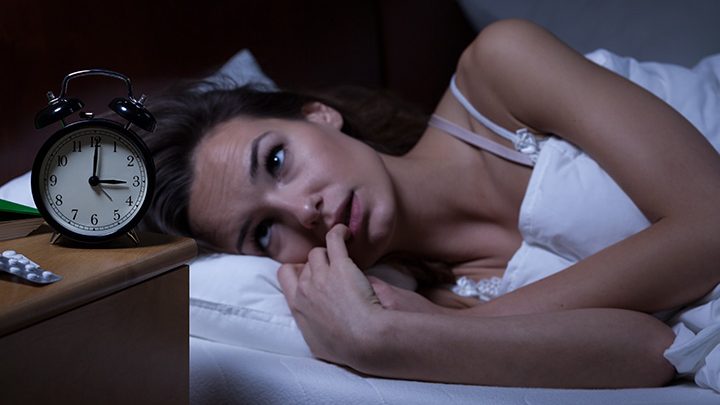Meditation & Sleep
What’s to know about sleep deprivation?
The loss of sleep is a common problem in modern society, affecting many individuals at some point in their lives.

Sleep deprivation occurs when an individual gets less sleep than they need to feel awake and alert. People vary in how little sleep is needed to be considered sleep-deprived. Some people such as older adults seem to be more resistant to the effects of sleep deprivation, while others, especially children and young adults, are more vulnerable.
Although occasional sleep interruptions are generally no more than a nuisance, ongoing lack of sleep can lead to excessive daytime sleepiness, emotional difficulties, poor job performance, obesity and a lowered perception of quality of life.
There is no questioning the importance of restorative sleep, and a certain amount of attention is necessary to both manage and prevent sleep deprivation.
This Medical News Today Knowledge Center article examines the consequences of sleep deprivation, along with what can be done to treat and prevent it.
Here are some key points about sleep deprivation. More detail and supporting information is in the main article.
- Sleep loss alters normal functioning of attention and disrupts the ability to focus on environmental sensory input
- Lack of sleep has been implicated as playing a significant role in tragic accidents involving airplanes, ships, trains, automobiles and nuclear power plants
- Children and young adults are most vulnerable to the negative effects of sleep deprivation
- Sleep deprivation can be a symptom of an undiagnosed sleep disorder or other medical problem
- When you fail to get your required amount of sufficient sleep, you start to accumulate a sleep debt.
Symptoms
The main symptom of ongoing sleep loss is excessive daytime sleepiness, but other symptoms include:
- yawning
- moodiness
- fatigue
- irritability
- depressed mood
- difficulty learning new concepts
- forgetfulness
- inability to concentrate or a “fuzzy” head
- lack of motivation
- clumsiness
- increased appetite and carbohydrate cravings
- reduced sex drive
Effects
Sleep deprivation can negatively affect a range of systems in the body.
It can have the following impact:
- Not getting enough sleep prevents the body from strengthening the immune system and producing more cytokines to fight infection. This can mean a person can take longer to recover from illness as well as having an increased risk of chronic illness.
- Sleep deprivation can also result in an increased risk of new and advanced respiratory diseases.
- A lack of sleep can affect body weight. Two hormones in the body, leptin and ghrelin, control feelings of hunger and satiety, or fullness. The levels of these hormones are affected by sleep. Sleep deprivation also causes the release of insulin, which leads to increased fat storage and a higher risk of type 2 diabetes.
- Sleep helps the heart vessels to heal and rebuild as well as affecting processes that maintain blood pressure and sugar levels as well as inflammation control. Not sleeping enough increases the risk of cardiovascular disease.
- Insufficient sleep can affect hormone production, including growth hormones and testosterone in men.
Causes
Sleep deprivation occurs when someone does not get a healthy amount of sleep.
The National Sleep Foundation (NSF) 2015 recommendations for appropriate sleep durations for specific age groups are:
- Newborns (0 to 3 months): 14 to 17 hours each day
- Infants (4 to 11 months): 12 to 15 hours
- Toddlers (1 to 2 years): 11 to 14 hours
- Preschoolers (3 to 5 years): 10 to 13 hours
- School-age children (6 to 13 years): 9 to 11 hours
- Teenagers (14 to 17 years): 8 to 10 hours
- Adults (18 to 64 years): 7 to 9 hours
- Older adults (over 65 years): 7 to 8 hours
Some groups of people may consider sleep as wasted time and purposely deprive themselves of sleep to pursue other things such as entertainment, educational goals, or money-making pursuits.
This intentional sleep deprivation is most likely to be seen in teenagers and young adults.
Others may unintentionally not get enough sleep because of shift work, family obligations, or demanding jobs.
Consistent sleep-wake patterns of going to bed late, frequent nighttime arousals, or waking up early can lead to sleep deprivation and the accumulation of sleep debt.
Additional causes of sleep deprivation include medical problems such as depression, obstructive sleep apnea, hormone imbalances, and other chronic illnesses.
Treatment
Treatment is only required when a person physically cannot get to sleep, due to either physical or psychological difficulties.
A therapist or sleep specialist will be able to offer guidance and coping techniques for reaching a restful state and sleeping.
There are two main avenues of treatment for sleep deprivation: Behavioral and cognitive measures and medications.
Behavioral and cognitive treatments
There are a number of effective methods to enhance sleep that do not require medication, including:
- Relaxation techniques: Progressive muscle relaxation involving tensing and untensing different muscles in the body to help calm the body. Meditation techniques, mindfulness training, breathing exercises, and guided imagery can also help in this area. Audio recordings are available that can help a person fall asleep at night.
- Stimulation control: This involves controlling pre-bedtime activities and surroundings to moderate the sleeping pattern. For example, a person controlling their stimulus would spend time in bed only when they feel sleepy, which controls the association between being in bed and feeling ready to sleep.
- Cognitive behavioral therapy (CBT): This is a type of therapy designed to help people understand and change the thought patterns behind certain behaviors. It can challenge beliefs that may not be healthy and promote rational, positive thought. CBT can help a person to develop a healthier sleeping pattern.
Medications
When non-medicinal treatment is not effective, drugs are available that can help induce sleep. Some are available over-the-counter (OTC), and some are only available with a valid prescription.
There is a wide range of available options, including benzodiazepines, non-benzodiazepine hypnotics, and melatonin receptor antagonists.
However, some people form a dependency on sleeping medications. It is important to limit the dosage and try to use non-medicinal measures where possible.
Home management
The good news is that most of the negative effects of sleep deprivation reverse when sufficient sleep is obtained. The treatment for sleep deprivation is to satisfy the biological sleep need, prevent deprivation and “pay back” accumulated sleep debt.
Some suggestions for good sleep habits include:
- going to bed when tired
- following a routine for bed and wake-up times, keeping it consistent every day of the week
- avoiding eating 2 to 3 hours before bedtime
- if unable to fall asleep after 20 minutes of trying, going to another room and trying to read until feeling sleepy, then returning to bed
- engaging in regular exercise during the day
- keeping the bedroom quiet, dark and a comfortably cool temperature
- turning off electronic devices when you go to bed
Paying off the sleep debt
When you fail to get your required amount of sufficient sleep you start to accumulate a sleep debt. For example, if you need 7 hours of sleep nightly to feel awake and alert and only get 5 hours, you have a sleep debt of 2 hours. If you continue that pattern for five nights, you have an accumulated sleep debt of 10 hours.
The only way to erase a sleep debt is to get more sleep. Depending on the scale of the sleep debt, it may take some time to recover fully. However, the positive effects of paying this debt off will be felt quickly.
To pay back a sleep debt, it is necessary to start getting the sleep you need, plus an additional hour or so per night, until the debt is paid. Afterwards, the required amount of sleep can be resumed without the additional hour.
Even if the sleep debt is hundreds or even thousands of hours, it can still be successfully reconciled with a conscious effort to restructure obligations, and allowing sufficient time off to recover. You will know you have paid back your sleep debt when you wake up feeling refreshed, and you do not feel excessively drowsy during the day.
If sleep deprivation is ongoing, and negative symptoms persist despite practicing good sleep hygiene measures, consultation with a healthcare provider is recommended.
Diagnosis
It is important when diagnosing sleep deprivation to identify an ongoing cycle of poor sleep.
The first step for recognizing a sleep problem is to keep a written sleep history in a sleep log. Write down each day how many hours sleep you have, how many times per night you wake up, how rested you feel after waking up, and any feelings of sleepiness you experience during the day.
If you have a partner, it may be worth asking them to note any snoring, gasping, or limb-jerking, as a doctor may also ask about this.
It will then be possible to present this information to any doctor you visit in a meaningful way.
Sleep specialists can also identify a pattern using a polysomnogram, or sleep study. This is carried out in a sleep laboratory.
Electrodes are placed at various points on the body, including the scalp and face. The person with suspected sleep deprivation will sleep overnight at a sleep clinic, and these monitors will measure breathing, blood, heart rate and rhythm, muscle activity, and brain and eye movements during sleep.
Especially in those who wilfully sleep too little, diagnosis can be as simple as recognizing that you do not get enough sleep and deciding to make changes.
Complications
Sleep deprivation weakens the ability of the part of the brain that handles reasoning, known as the prefrontal cortex, to control the emotional part, the amygdala. This leads to the abnormal processing of emotions.
Sleep also appears to be necessary to prepare the brain for learning. When the brain is deprived of sleep, it is difficult to concentrate and form new memories.
When we stay awake all night or significantly cut sleep short, the body does not release the hormones necessary to regulate growth and appetite, and instead forms an overabundance of stress chemicals, such as norepinephrine and cortisol.
Research suggests shorter sleep durations may be a predictor of weight gain in adults and children. Each 1 hour reduction in sleep time per day is associated with an increase of 0.35 kilograms (kg) in body weight. These changes result in an increased risk for hypertension, diabetes, obesity, heart attack, and stroke in the sleep-deprived individual.
Sleep loss can have a profound impact on both emotional function and normal thinking abilities in healthy individuals, resulting in:
- reduced tendency to think positively
- bad moods, a decreased willingness to solve problems
- a greater tendency towards superstitious and magical thinking
- intolerance and less empathy toward others
- poor impulse control
- inability to delay gratification
Sleep-deprived people are more likely to report increased feelings of worthlessness, inadequacy, powerlessness, failure, low self-esteem, poor job performance, conflicts with coworkers, and reduced quality of life. Many of these deficits remain even when alertness is sustained with stimulants such as caffeine.
Finally, sleep-deprived individuals score higher on clinical scales measuring depression, anxiety, and paranoia.
Increased risk of accidents
After around 16 hours of staying awake, the body attempts to balance the need for sleep. If a person does not get enough sleep, the brain obtains sleep through short sleep attacks called microsleeps.
This is an uncontrollable brain response that renders a person unable to process environmental stimulation and sensory information for a brief amount of time.
A person’s eyes often remain open during microsleeps, but they are essentially “zoned out.” As the nature of these attacks is sudden, the consequences of a sleep-deprived individual operating heavy machinery or driving can be catastrophic to both the individual as well as innocent bystanders.
Microsleeps will continue to occur despite an individual’s forced attempt to stay awake, and because of this inbuilt sleep mechanism, it is extremely difficult for an individual to remain awake for more than 48 hours straight.
Prevention
Sleep deprivation can be linked to serious accidents and poor job or school performances. It can substantially lower an individual’s overall quality of life. Lack of sleep disrupts the brain’s ability to balance emotions and thinking abilities, lowers the body’s natural defenses, and increases the chances of developing chronic medical problems.
While the occasional poor night’s sleep is not a serious problem in itself, persistent sleep deprivation can be.
There is no substitute for restorative sleep. A certain amount of care should be taken to prevent ongoing sleep deprivation in individuals of all ages.




